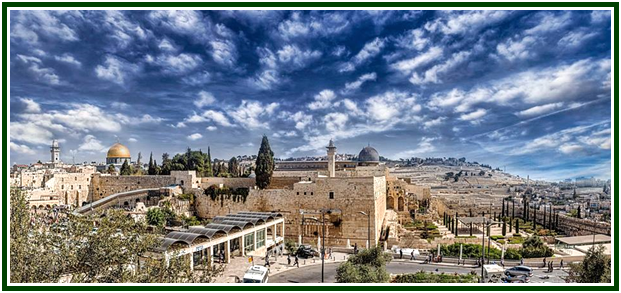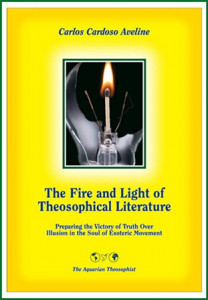
Every Nation Has Something
Good to Learn From All the Others
Good to Learn From All the Others
Carlos Cardoso Aveline

A view of the Temple Mount in Jerusalem
A great nation with a small territory, the state of Israel enlightens the spiritual center of the Western culture and its religious map.
While fundamentally Jewish, Israel includes Arabs, Druses and Christians: diversity is its strength, and Judaism itself has within it a variety of religious points of view.
The Jewish nation is a test tube and a research laboratory for the cross-cultural and brotherly civilization of the future.
The country belongs to mankind, and this does not mean it does not belong to the Jews. Israel belongs to mankind because the Jews themselves belong to mankind and have a duty towards it. Every nation in these times belongs to all of humanity, and the older the nation the deeper its duty regarding life’s evolution.
The transcendent character of the Jewish national anthem, “The Hope”, suggests the Utopian substance of the project:
“As long as the Jewish spirit is yearning deep in the heart,
With eyes turned toward the East, looking toward Zion,
Then our hope – the two-thousand-year-old hope – will not be lost:
To be a free people in our land,
The land of Zion and Jerusalem.” [1]
Since 1948 Israel is the imperfect yet evolving expression of a 2,000 years hope. A complex and inclusive country, its Utopian dimensions go far beyond the kibbutzim [2], the moshavim [3] and its more recent and controversial settlements. The stark ideological contrasts among these different projects are a testimony to the transcendence of the Israeli Utopia. The building of Israel is much bigger than any of its ideological approaches and narratives. Every aspect of the Israeli society, including its numerous inconsistencies and resounding failures, speaks of the richness and sacredness of its potentialities. The country is a human creative process evolving in high speed and working in significant levels of temperature.
While from the point of view of historical time the state of Israel is a recent project, it expresses the soul and the “ethos” of one among the oldest nations alive. It is in fact so young that some countries can’t even believe its growth, or accept it. Such a resistance might be seen as a natural expression of ignorance. Young people and new enterprises must indeed prove their value and fight for their place in Life. As a nation, however, as a philosophy and culture, Israel is far from being too young, and it has a few lessons to teach Christians and Muslims.
Respect for One’s Sources of Inspiration
One of the tenets Christianity and Islam must learn from the Jewish nation is the principle of respect for one’s elders.
Despising, denying, robbing and attacking the source of one’s spiritual inspiration is not a good idea. In due time it constitutes a self-defeating attempt.
There is no point in denying that the root-source of Christian and Muslim traditions is Jewish. It is an ugly thing to do to spit in the plate one eats from, or to bite the hand that spiritually gave us food. The roots of Christianity and Islam are Hebrew and are Pagan. The followers of Jesus and Mohammed must learn to say “thanks” to the older religions and cultures, instead of plagiarizing and persecuting them. The Jewish culture also has historical roots which are older than itself, in Egypt and in the East.
Renouncing to Violence as a Way to Expand
One second point to learn from the Jews is that no religion or philosophy can legitimately expand its influence through violence, torture and murder.
Religious men will not attain celestial consciousness by committing crimes against humanity in the name of any god their priests may have invented. Helena Blavatsky was much maligned for being an independent woman-thinker and for daring to challenge the Vatican in the 19th century. She wrote about the methods used by Christians and Muslims to expand their power:
“Verily, the fiendish spirits of fanaticism, of early and mediaeval Christianity and of Islam, have from the first loved to dwell in darkness and ignorance; and both have made ‘…the sun like blood, the earth a tomb,/ The tomb a hell, and hell itself a murkier gloom!’ Both creeds have won their proselytes at the point of the sword; both have built their churches on heaven-kissing hecatombs of human victims.” [4]
Judaism, on the other hand, is basically non-violent.
Comparative studies show Jewish philosophy and ethics are among the richest in universal literature. Israel uses violence in a self-restrained way and only against aggressors whose aim is to destroy it. The Jewish nation cherishes life.
On Learning to Learn
Being young, the state of Israel is especially capable of learning. Its sociological dynamism is superb. The sense of danger that permeates Israeli life gives it intensity and tenacity. No sector of its society is the sole owner of the truth, although some of them feel tempted to act as if they were. Politics in Israel must not be a dialogue of the deaf. Left-wing parties have much to learn from the national camp and or right-wing parties; but the left has also quite a few contributions to make to the country. A utopia or ideal-place is built by researching, by learning, and by learning to learn. Looking around the world, one sees a limited number of Utopian projects being practically implemented whose results are half as good as those in Israel. This, too, offers a lesson to other countries around the world.
Every nation has something good to learn from all the others, and the bad news for pessimists is unavoidable: there is no point in believing Israel’s shortcomings are so many, and so deep, that it cannot be seen as an on-going project of search for a utopia or ideal society.
Even if the moral and ethical failings of Israel were twice as big as they are, it would still be an attempt to achieve a noble ideal.
Every perceived imperfection in it, as in humanity as a whole, is but the shadow of a future perfection. There is time enough to learn. There is a time for everything, in fact; and there is also a time for a nation to be reborn. Israel is not isolated. Its challenges are shared with mankind. A Raja Yogi of the Himalayas wrote these words regarding the human future and the need of a global civilization based on ethics and respect for life:
“We have the weakness to believe in ever recurrent cycles and hope to quicken the resurrection of what is past and gone. We could not impede it even if we would. The ‘new civilization’ will be but the child of the old one, and we have but to leave the eternal law to take its own course to have our dead ones come out of their graves; yet, we are certainly anxious to hasten the welcome event.” [5]
Everything is cyclic in Nature. The notion of reincarnation is quietly central to the Jewish mysticism, as Tyron Goldschmidt and Beth Seacord demonstrate in their 2013 essay “Judaism, Reincarnation and Theodicy”.[6]
Cycles and reembodiments can be individual, and they can be collective. Israel, as a country, is a nation reborn. It is now transiting somewhere from childhood, or perhaps from adolescence: it depends on the point of view adopted to look at its evolution from 1948.
Life is certainly dangerous, and wisdom is life intensified. Possessing a rich wisdom tradition means that one must walk a perilous path. Nuclear proliferation is presently the main threat to Israel’s existence, and to human existence as well.
Just as in the 1930s and 1940s, the Jewish nation is once more in a decisive position in the transcendent effort to preserve and improve human experience on earth, and to expand its quality through ethics and through wisdom.
The one most unjustly attacked nation, the longest hated people on earth, is also among the best in Ethics, in philosophy and wisdom. This is no small issue for the Law of Karma as taught by Eastern esoteric tradition.
Dangers must not be entirely unwelcome, for they force us to open the eyes so we can see Beauty, Truth and Goodness in unexpected places.
Severe difficulties force us to live an inner awakening which enables us to activate the positive aspects in any situation, and to adopt a creative attitude often called “utopian”.
NOTES:
[1] Listen to it at http://stateofisrael.com/anthem/HaTikvah.mp3 . See also http://www.stateofisrael.com/anthem/ .
[2] A kibbutz, plural form “kibbutzim”, is a collective community in Israel, usually based on agriculture. The first kibbutz was established in 1909. Kibbutzim began as utopian communities combining socialism and Zionism.
[3] Moshav, plural form, moshavim (lit. settlement, or village), is a type of Israeli town or settlement, in particular a cooperative agricultural community of individual farms.
[4] “The Secret Doctrine”, Helena P. Blavatsky, The Theosophy Co., Los Angeles, volume I, p. xli.
[5] “The Mahatma Letters”, TUP, Pasadena, CA, USA, Letter XXVIII, pp. 214-215.
[6] Published in “Faith and Philosophy”, October 2013, pp. 393-417. “Judaism, Reincarnation and Theodicy” is available online at the blog of the Association for the Philosophy of Judaism.
000
The above article was first published at “The Times of Israel” in April 2015.
000
On the role of the esoteric movement in the ethical awakening of mankind during the 21st century, see the book “The Fire and Light of Theosophical Literature”, by Carlos Cardoso Aveline.

Published in 2013 by The Aquarian Theosophist, the volume has 255 pages and can be obtained through Amazon Books.
000